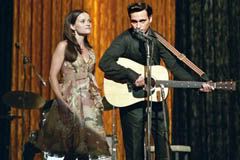WALK THE LINE: Carter-Cash Love Story
WALK THE LINE
(biodrama)
Time: 138 mins
Rating: * * * *
BIOGRAPHICAL movies about popular singers and other showbiz celebs can be rather predictable. Take the 2004 Oscar contender Ray, for example. First, we have the struggle towards stardom, the success and the love affairs, and the struggle with booze and drugs.
Walk The Line, the biopic of Country & Western singer Johnny Cash, has all these — and more. It keeps our attention glued to the screen, our feet tapping to the music, and our hearts crying out for the protagonist and his quest for the one woman he has come to love. I don’t know about you, but in my book, this is top class entertainment.
The Johnny R. Cash story opens in Dyess, Arkansas, in the US in 1944, where 12-year-old Johnny and his parents are devastated by the death of his older brother Jack (Lucas Till). Next, we skip to Landsberg, Germany, in 1952 where Cash (now played by Joaquin Phoenix) pens the famous Folsom Prison Blues. Then, while married to Vivian (Ginniffer Goodwin) in Memphis in 1955, Cash starts a band specialising in gospel songs. That audition scene, with the legendary Sam Philips (Dallas Roberts) of Sun Records, is pivotal in defining Cash’s music. Sam says his gospel renditions sound copy- cat and suggests that he sing something of his own. And that’s when Folsom Prison Blues brought Cash his first recording contract.
Road shows follow and Cash finds himself in the company of Jerry Lee Lewis and his childhood idol June Carter (Reese Witherspoon). In US showbiz, road shows often come with booze and drugs — and these are the two obstacles in Cash’s quest for success and in his love affair with June. Ironically, they also help him write that title hit song, Walk The Line.
Indeed, one of the most fascinating things about this movie is how director James Mangold provides the background story to some of Cash’s more famous hits. Mangold delves deep into Cash’s stormy relationship with his father — and his protracted wooing of June who is put off by Cash’s drink and drugs problem. And it is this love story — of a flawed human being trying to win the hand of his ‘soul-mate’ — that gives life and emotion to the movie.
Phoenix does a good impersonation of Cash, even though he is physically different from the legendary ‘Man in Black’. He has perfected his voice, speaking and singing like Cash himself.However, the best performance (and top Oscar contender) comes from Witherspoon who plays June Carter like the smart, warm and caring personality that she really was.
Understandably, Mangold leaves out June’s major dramas, like her two failed marriages (which are mentioned off-screen) to concentrate on her relationship with Cash. This only makes us yearn for a biopic on June’s life.It is rather risky to have the actors sing those famous hits but the gamble paid off reasonably. For comparison, Cash’s and Carter’s real voices come with the final credits.

2 Comments:
Hi,
I think that whilst this was a good stab at telling the Cash story, Cash fans perhaps would have liked the darker side to Cash to have been brought out to the fore a bit more and a little more about him to have been explored for example his 'American Recordings period perhaps when he was getting older and ill.
But all in all a satisfying watch.
Thanks for the input. I agree that the treatment was a bit too superfluous. However, the period they cover is only up to the time they got married.
How is your movie coming up? Can't wait to see it though.
Post a Comment
<< Home